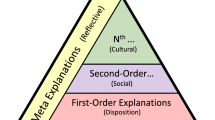Abstract
In this paper, we present a constraint-based model of cooperative agents for information systems dialogues, with an emphasis on how the agents detect and resolve situations in which the user's information needs have been over-constrained. The constraint-based model of the information agents integrates and extends the AI techniques of constraint satisfaction, solution synthesis and constraint hierarchy, providing an incremental computational mechanism for constructing and maintaining partial parallel solutions. Such a mechanism supports immediate detection of over-constrained situations. In addition, we explore using the knowledge in the solution synthesis network to support different relaxation strategies to support cooperative dialogue behaviors.
Similar content being viewed by others
References
Abella, A., Brown, M. K., & Buntschuh, B. (1996). Development principles for dialogue-based Interfaces. In Proceedings of ECAI'96 Workshop on Dialogue Processing in Spoken Language Systems, pages 1–7.
Beale, S. (1997). HUNTER-GATHERER: Applying Constraint Satisfaction, Branch-and-Bound and Solution Synthesis to Computational Semantics. Ph.D. thesis, School of Computer Science, Carnegie Mellon University.
Carletta, J. (1996). Assessing agreement on classification tasks: The kappa statistic. Computational Linguistics.
Donaldson, T., & Cohen, R. (1997). A constraint satisfaction framework for managing mixed-initiative discourse. In Technical Reports of 1997 AAAI Spring Symposium on Mixed-Initiative Interaction.
Elzer, S., Chu, J., & Carberry, S. (1994). Recognizing and utilizing user preferences in collaborative consultation dialogues. In User Modeling Conference.
Freeman-Benson, B., & Maloney, J. (1989). The DeltaBlue algorithm: An incremental constraint hierarchy solver. In Proceedings of the Eighth International PhoenixConfer ence on Computers and Communications.
Freuder, E. C. (1978). Synthesizing constraint expressions. Communications ACM 21(11): 958–966.
Freuder, E. C. (1995). The many paths to satisfaction. In Meyer, M., ed., Lecture Notes in Computer Science: Constraint Processing, pages 103–119.
Freuder, E. C., & Wallace, R. J. (1997). Suggestion strategies for constraint-based MATCHMAKER agents. In Constraints and Agents: Papers From the 1997 AAAI Workshop, pages 105–111. Technical Report WS-97-05, AAAI Press.
Kaplan, S. J. (1979). Cooperative responses from a portable natural language data base query system. Ph.D. thesis, School of Computer and Information Science, University of Pennsylvania.
Litman, D. J., Pan, S., & Walker, M. A. (1998). Evaluating response strategies in a Web-based spoken dialogue agent. In COLING/ACL-98, pages 780–786.
Maloney, J. H. (1991). Using Constraints for User Interface Construction. Ph.D. thesis, Department of Computer Science and Engineering, University of Washington.
Pieraccini, R., Levin, E., & Eckert, W. (1997). AMICA: The AT&T mixed initiative conversational architecture. In Proceedings of EUROSPEECH 97.
Qu, Y. A constraint-based model of mixed-initiative dialogue for information-seeking interactions. Ph.D. thesis, Language Technologies Institute, School of Computer Science, Carnegie Mellon University, Forthcoming.
Transcripts, S. (1992). Transcripts derived from audiotape conversations made at SRI International, Menlo Park, CA. Prepared by Jacqueline Kowtko under the direction of Patti Price.
Tsang, E., & Foster, N. (1990). Solution Synthesis in the Constraint Satisfaction Problem. Technical Report CSM-142, Department of Computer Science, University of Essex.
Walker, M. A., Litman, D. J., Kamm, C. A., & Abella A. (1997). PARADISE: A framework for evaluating spoken dialogue agents. In: Proceeding of ACL-97.
Author information
Authors and Affiliations
Rights and permissions
About this article
Cite this article
Qu, Y., Beale, S. Cooperative Resolution of Over-Constrained Information Requests. Constraints 7, 29–47 (2002). https://doi.org/10.1023/A:1017988309378
Issue Date:
DOI: https://doi.org/10.1023/A:1017988309378




